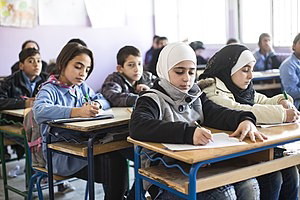Right to education
The privilege to training has been perceived as a basic liberty in various worldwide shows, remembering the International Covenant for Economic, Social and Cultural Rights which perceives an option to free, necessary essential instruction for every one of the, a commitment to create auxiliary schooling open to all, on specific by the reformist presentation of free auxiliary instruction, just as a commitment to create impartial admittance to advanced education, preferably by the reformist presentation of free advanced education. In 2021, 171 states were gatherings to the Covenant[1]
In 2019, an expected 260 million kids didn't approach school training on a worldwide scale, and social disparity was a significant cause.[2]
. Syrian Refugee students, Lebanon, 2015
Worldwide legitimate premise
Show on the Rights of Persons with Disabilities
states parties
states that have marked, however not approved
states that have not marked
The privilege to training is reflected in article 26 of the Universal Declaration of Human Rights, which states:
"Everybody has the option to training. Instruction will be free, at any rate in the rudimentary and essential stages. Rudimentary schooling will be necessary. Specialized and proficient instruction will be made commonly accessible and advanced education will be similarly open to all based on merit. Schooling will be coordinated to the full advancement of the human character and to the fortifying of regard for common liberties and basic opportunities. It will advance arrangement, resistance and companionship among all countries, racial or strict gatherings, and will assist the exercises of the United Nations for the upkeep of harmony. Guardians have an earlier option to pick the sort of training that will be given to their children."[3]
The privilege to instruction has been reaffirmed in the 1960 UNESCO Convention against Discrimination in Education, the 1966 International Covenant on Economic, Social and Cultural Rights,[4][5][6] the 1981 Convention on the Elimination of All Forms of Discrimination Against Women,[7] the 1989 Convention on the Rights of the Child,[8] and the 2006 Convention on the Rights of Persons with Disabilities.[9]
In Africa, both the 1981 the African Charter on Human and Peoples' Rights[10] and the 1990 African Charter on the Rights and Welfare of the Child perceive the privilege to education.[11]
In [Europe], Article 2 of the main Protocol of 20 March 1952 to the European Convention on Human Rights expresses that the privilege to schooling is perceived as a common freedom and is perceived to build up a qualification to instruction. As indicated by the International Covenant on Economic, Social and Cultural Rights, the privilege to schooling incorporates the option to free, mandatory essential instruction for each of the, a commitment to create auxiliary training available to all specifically by the reformist presentation of free optional schooling, just as a commitment to create impartial admittance to advanced education specifically by the reformist presentation of free advanced education. The privilege to instruction likewise incorporates a duty to give essential schooling to people who have not finished essential training. Notwithstanding these admittance to training arrangements, the privilege to instruction incorporates likewise the commitment to dispose of separation at all levels of the instructive framework, to set least norms, and to improve quality. The European Court of Human Rights in Strasbourg has applied this standard for instance in the Belgian semantic case.[7] Article 10 of the European Social Charter ensures the privilege to professional education.[12]
Agreeing Indian constitution under 86th Amendment act 2002 gives an option to free and obligatory training up to 6–14 years old.
Definition
Young lady understudy in Mogadishu
Schooling comprises of formal institutional directions. By and large, worldwide instruments utilize the term in this sense and the privilege to schooling, as secured by global common freedoms instruments, alludes basically to training from a limited perspective. The 1960 UNESCO Convention against Discrimination in Education characterizes schooling in Article 1(2) as: "numerous types and levels of instruction, (counting such) admittance to training, the norm and nature of training, and the conditions under which it is given."[13]
An understudy show the others in Mogadishu
From more extensive perspective training may portray "all exercises by which a human gathering communicates to its relatives an assemblage of information and abilities and an ethical code which empower the gathering to subsist".[13] In this sense instruction alludes to the transmission to a resulting age of those abilities expected to perform assignments of every day living, and further passing on the social, social, profound and philosophical upsides of the specific local area. The more extensive significance of schooling has been perceived in Article 1(a) of UNESCO's 1974 Recommendation concerning Education for International Understanding, Co-activity and Peace and Education identifying with Human Rights and Fundamental Freedoms.[14]
"the whole cycle of public activity through which people and gatherings of people figure out how to grow intentionally inside, and to serve, the public and global networks, the entire of their own capacities, perspectives, aptitudes and knowledge."[13]
The European Court of Human Rights has characterized schooling from a limited perspective as "educating or directions... specifically to the transmission of information and to scholarly turn of events" and from a more extensive perspective as "the entire interaction whereby, in any general public, grown-ups try to send their convictions, culture and different qualities to the young."[13]
The Abidjan standards were passed in mid 2019 and give complete core values on the convergence between private schooling and the privilege to instruction
Evaluation of satisfaction
The 4As
The satisfaction of the privilege to schooling can be surveyed utilizing the 4 As system, which declares that for instruction to be a significant right it should be accessible, available, satisfactory and versatile. The 4 As system was created by the previous UN Special Rapporteur on the Right to Education, Katarina Tomasevski, however isn't really the standard utilized in each global basic liberties instrument and henceforth not a nonexclusive manual for how the privilege to instruction is treated under public law.[15]
The 4 As system recommends that administrations, as the excellent obligation carriers, need to regard, ensure and satisfy the privilege to instruction by making schooling accessible, available, adequate and versatile. The system additionally puts obligations on different partners in the instruction cycle: the kid, which as the favored subject of the privilege to schooling has the obligation to agree with mandatory training prerequisites, the guardians as the 'principal instructors', and expert instructors, in particular teachers.[15]
The 4 As have been additionally explained as follows:[16]
Accessibility – financed by governments, training is sans general and necessary. There ought to be appropriate framework and offices set up with satisfactory books and materials for understudies. Structures should meet both wellbeing and sterilization norms, for example, having clean drinking water. Dynamic enlistment, legitimate preparing and suitable maintenance techniques ought to guarantee that enough qualified staff is accessible at each school.[17]
Availability – all kids ought to have equivalent admittance to class administrations, paying little mind to sex, race, religion, identity or financial status. Endeavors ought to be made to guarantee the consideration of underestimated bunches including offspring of exiles, the destitute or those with handicaps; in short there ought to be general admittance to instruction for example admittance to all. Kids who fall into[18] destitution ought to be allowed the entrance of training since it improves the development of their psychological and social state. There ought to be no types of isolation or forswearing of admittance to any understudies. This incorporates guaranteeing that legitimate laws are set up against any kid work or abuse to keep youngsters from acquiring essential or auxiliary instruction. Schools should be inside a sensible distance for kids inside the local area, in any case transportation ought to be given to understudies, especially those that may live in rustic territories, to guarantee approaches to class are protected and advantageous. Instruction ought to be reasonable to all, with reading material, supplies and regalia gave to understudies at no extra costs.[19
a free school established by the twin instructors in Indonesia
Worthiness – the nature of training gave ought to be liberated from separation, important and socially suitable for all understudies. Understudies ought not be required to adjust to a particular strict or philosophical perspectives. Strategies for instructing ought to be level headed and fair and material accessible ought to mirror a wide exhibit of thoughts and convictions. Wellbeing and security ought to be underlined inside schools including the disposal of any types of flogging. Demonstrable skill of staff and educators ought to be maintained.[20]
Flexibility – instructive projects ought to be adaptable and ready to change as indicated by cultural changes and the requirements of the local area. Recognition of strict or social occasions ought to be regarded by schools to oblige understudies, alongside furnishing satisfactory consideration to those understudies with disabilities.[21]
Various global NGOs and good cause work to understand the privilege to training utilizing a rights-based way to deal with development.[22]
Chronicled development
In Europe, before the Enlightenment of the eighteenth and nineteenth century, schooling was the obligation of guardians and the congregation. With the French and American Revolution, instruction was set up likewise as a public capacity. It was imagined that the state, by accepting a more dynamic job in the circle of schooling, could assist with making training accessible and available to all. Instruction had up to this point been essentially accessible to the upper social classes and state funded training was seen as a methods for understanding the populist standards underlining both revolutions.[23]
Nonetheless, neither the American Declaration of Independence (1776) nor the French Declaration of the Rights of Man and of the Citizen (1789) secured the privilege to schooling, as the liberal ideas of basic freedoms in the nineteenth century visualized that guardians held the essential obligation for giving training to their kids. It was the states commitment to guarantee that guardians consented to this obligation, and numerous states instituted enactment making school participation necessary. Besides, kid work laws were sanctioned to restrict the quantity of hours out of each day youngsters could be utilized, to guarantee kids would go to class. States likewise got engaged with the lawful guideline of educational plans and set up least instructive standards.[24]
In On Liberty John Stuart Mill composed that an "training set up and constrained by the State should possibly exist, in the event that it exists by any stretch of the imagination, as one among many contending tests, carried on with the end goal of model and improvement to keep the others up to a specific norm of greatness." Liberal scholars of the nineteenth century highlighted the threats to an excessive amount of state association in the circle of schooling, yet depended on state intercession to decrease the predominance of the congregation, and to ensure the privilege to instruction of kids against their own folks. In the last 50% of the nineteenth century, instructive rights were remembered for homegrown bills of rights.[24] The 1849 Paulskirchenverfassung, the constitution of the German Empire, unequivocally impacted ensuing European constitutions and committed Article 152 to 158 of its bill of rights to schooling. The constitution perceived instruction as a component of the state, free of the congregation. Exceptional at that point, the constitution declared the option to free training for poor people, however the constitution didn't expressly need the state to set up instructive organizations. Rather the constitution secured the privileges of residents to establish and work schools and to give home instruction. The constitution additionally given to opportunity of science and instructing, and it ensured the privilege of everyone to pick a business and train for it.[25]
The nineteenth century likewise saw the advancement of communist hypothesis, which held that the essential assignment of the state was to guarantee the monetary and social prosperity of the local area through government mediation and guideline. Communist hypothesis perceived that people had cases to essential government assistance administrations against the state and schooling was seen as one of these government assistance qualifications. This was rather than liberal hypothesis at that point, which viewed non-state entertainers as the superb suppliers of training. Communist beliefs were revered in the 1936 Soviet Constitution, which was the main constitution to perceive the privilege to instruction with a relating commitment of the state to give such schooling. The constitution ensured free and necessary schooling at all levels, an arrangement of state grants and professional preparing in state endeavors. Thusly, the privilege to instruction included firmly in the constitutions of communist states.[25] As a political objective, right to schooling was pronounced in F. D. Roosevelt's 1944 discourse on the Second Bill of Rights.
The part of schooling for people, the general public and the state
Instruction in the entirety of its structures (casual, non-formal, and formal) is critical to guarantee human nobility, all things considered. The points of training, as set out in the International common freedoms law (IHRL), are subsequently completely coordinated to the acknowledgment of the person's privileges and dignity.[26] These incorporate, among others, guaranteeing human poise and the full and all encompassing advancement of the human character; cultivating physical and intellectual turn of events; taking into consideration the securing of information, abilities, and gifts; adding to the acknowledgment of the maximum capacity of the individual; improving confidence and expanding certainty; empowering regard for basic liberties; forming an individual's feeling of personality and connection with others; empowering socialization and significant communication with others; empowering an individual to shape their general surroundings empowers their cooperation in local area life; adding to a full and fulfilling life inside society; and enabling and taking into consideration the expanded pleasure in other human rights.[27]
The numerous advantages of schooling
Schooling is likewise groundbreaking for the state and society. As quite possibly the main components by which gatherings of people, specifically native people groups and minorities are kept up from one age to another, passing on language, culture, personality, qualities, and customs, schooling is additionally one of the key ways states can guarantee their financial, social, political, and social interests.[27]
The primary part of instruction inside a general public and the state is to:[27]
Take into account the transmission of culture, values, character, dialects, and customs starting with one age then onto the next;
Advance supportable monetary development;
Encourage vote based and tranquil social orders;
Support investment and consideration in dynamic cycles;
Energize a rich social life;
Help fabricate a public personality;
Advance social equity points;
Defeat tireless and settled in difficulties;
Energize feasible turn of events, including regard for the environment.[27]
Execution
Manila Science High School in Manila, Philippines
Worldwide law doesn't secure the privilege to pre-essential instruction and global archives by and large preclude references to training at this level.[28] The Universal Declaration of Human Rights expresses that everybody has the option to schooling, consequently the privilege applies to all people, in spite of the fact that kids are considered as the principle beneficiaries.[29]
The rights to instruction are isolated into three levels:
Essential (Elemental or Fundamental) Education. This will be obligatory and free for any youngster paying little mind to their identity, sex, spot of birth, or some other separation. After endorsing the International Covenant on Economic, Social and Cultural Rights States should give free essential instruction inside two years.
Optional (or Elementary, Technical and Professional in the UDHR) Education should be by and large accessible and available.
At the University Level, Education ought to be given by limit. That is, any individual who satisfies the important instruction guidelines ought to have the option to go to college.
Both auxiliary and advanced education will be made open "by each proper methods, and specifically by the reformist presentation of free education".[30]
Mandatory education
The acknowledgment of the privilege to schooling on a public level might be accomplished through mandatory instruction, or all the more explicitly free obligatory essential training, as expressed in both the Universal Declaration of Human Rights and the International Covenant on Economic, Social and Cultural Rights.[4][31]
Right to instruction for youngsters
. Geography in Montessori Early Childhood at QAIS
Iwo Jima, 24th MEU visit Kingdom of Bahrain 120715-M-TK324-019
The privileges of all youngsters from youth originate from the 1948 Universal Declaration of Human Rights. The revelation declared in article 1: 'All people are conceived free and equivalent in respect and rights'. The announcement expresses that basic liberties start upon entering the world and that adolescence is a period requesting uncommon consideration and help [art. 25 (2)]. The 1959 Declaration of the Rights of the Child certified that: 'humankind owes to the youngster the best it needs to give', including schooling. This was intensified by the International Covenant on Economic, Social and Cultural Rights of 1966 which expresses that: 'training will be coordinated to the full improvement of the human character and the feeling of its pride, and will fortify the regard for common liberties and key opportunities. [art. 13 (1)][32]
The World Declaration on Education for All (EFA) received in 1990 in Jomtien, Thailand, states in article 5 that: 'Learning starts upon entering the world [...] This calls for youth care and introductory instruction.' after 10 years, the Dakar Framework for Action on EFA set up six objectives, the first was: 'growing and improving youth care and training, particularly for the most defenseless and impeded youngsters.' Protection of offspring of any age from misuse and activities that would imperil their wellbeing, schooling and prosperity has additionally been accentuated by the International Labor Organization in Conventions No. 138 on the Minimum Age of Employment (1973) and No. 182 on the Prohibition and Immediate Action for the Elimination of the Worst Forms of Child Labor (1999). The United Nations added to such undertakings by the Declaration of the Rights of the Child collectively embraced by the General Assembly in 1959.[32]
There are different NGO's running after the privilege to training. EClickKart is one of such stages started by Rohit N Shetty[33] which expresses that Education is the fundamental right and EClickKart is running after it.[34]
The effect of privatization on the privilege to education
The privatization of instruction can have a positive effect for some gatherings of people, as expanded accessibility of learning openings, more noteworthy parental decision and a more extensive scope of educational plans. In any case, it can likewise have adverse consequences coming about because of lacking or deficient observing and guideline by the public specialists (schools without licenses, employing of undeveloped instructors and nonattendance of value affirmation), with expected dangers for social union and fortitude. Of specific concern: "Underestimated bunches neglect to appreciate the majority of positive effects and furthermore bear the lopsided weight of the adverse consequences of privatisation."[35] Furthermore, uncontrolled expenses requested by private suppliers could sabotage all inclusive admittance to schooling. All the more for the most part, this could contrarily affect the happiness regarding the privilege to decent quality schooling and on the acknowledgment of equivalent instructive opportunities.[36]
Supplemental private mentoring, or 'shadow training', which addresses one explicit component of the privatization of instruction, is additionally developing worldwide.[37] Often an indication of gravely working school systems,[38] private coaching, similar as different appearances of private schooling, can have both positive and adverse consequences for students and their instructors. On one hand, educating can be customized to the requirements of more slow students and instructors can enhance their school compensations. Then again, charges for private coaching may address a sizeable portion of family pay, especially among poor people, and can thusly set out imbalances in learning open doors. Furthermore, the way that a few instructors may invest more energy into private mentoring and disregard their normal obligations can unfavorably influence the nature of educating and learning at school.[39] The development of shadow training, the monetary assets activated by people and families, and the worries in regards to conceivable educator offense and defilement are driving a few services of training to endeavor to manage the phenomenon.[36][39]
Social Inequality
Young lady's school in Khyber Pakhtunkhwa, Pakistan, 2015.
In the year 2019, an expected 260 million youngsters didn't approach school training on a worldwide scale[40]
Female education
In the 21st century, sexual orientation imbalance is as yet a deterrent to general admittance to education.[41][42] Conservative mentalities towards the female sex job difficulties ladies' and young ladies' completely exercise of their entitlement to education.[43] Malala Yousafzai, lobbyist for widespread admittance to schooling.
Malala Yousafzai, lobbyist for female schooling
Inside the 750 million unskilled grown-ups on the planet, 66% are assessed to be ladies. The reasons for this are found among sex imbalance, misanthropic brutality, just as, marriage and pregnancy, frequently connected with destitution and geographic isolation.[44] In the second decade of 21st century, the promotion for ladies' entitlement to get to training turned into a worldwide development through the activism of Malala Yousafzai, a Pakistani Nobel laureate. [45][46]
Coronavirus 19
The COVID-19 pandemic influenced more than 90% of the world's understudies and was liable for the ascent of social disparity in the admittance to instruction. The worldwide downturn prompt to the pandemic extended extraordinary outcomes on schooling financing, making enduring consequences for the equivalent right training. [47] [48][49] Globally, during the pandemic, markers of sex, class, and nationality introduced themselves as elements of weakness in the admittance to fundamental rights like training and health.[50][51]Malala Yousafzai, lobbyist for female schooling
Inside the 750 million unskilled grown-ups on the planet, 66% are assessed to be ladies. The reasons for this are found among sex imbalance, misanthropic brutality, just as, marriage and pregnancy, frequently connected with destitution and geographic isolation.[44] In the second decade of 21st century, the promotion for ladies' entitlement to get to training turned into a worldwide development through the activism of Malala Yousafzai, a Pakistani Nobel laureate. [45][46]
Coronavirus 19
The COVID-19 pandemic influenced more than 90% of the world's understudies and was liable for the ascent of social disparity in the admittance to instruction. The worldwide downturn prompt to the pandemic extended extraordinary outcomes on schooling financing, making enduring consequences for the equivalent right training. [47] [48][49] Globally, during the pandemic, markers of sex, class, and nationality introduced themselves as elements of weakness in the admittance to fundamental rights like training and health.[50][51]
Circulation of free course books to youngsters in a school in Assam
In regardless of E-learning authentic target strolls towards the democratization of training access, contingent upon its quality, it tends to be a trouble in the accomplishment of this right. Understudies lacking social capital, family backing, and material conditions (counting admittance to quality electronic hardware and web) have had their admittance to training obstructed by this methodology of schooling. The re-visitation of study hall instructing during the COVID-19 pandemic created a contention between the privilege to wellbeing and the privilege to training. By getting back to the school before the pandemic was completely leveled out, understudies were presented to the SARS-CoV-2. Another perspective affixed by the pandemic, that likewise identifies with the privilege to wellbeing, is the harm to understudies' psychological health.[52][53] [54]

















Comments
Post a Comment